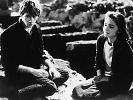Eye For Film >> Movies >> Blood (1989) Film Review
A young man (Pedro Hestnes), framed head-on in medium shot, receives a slap to the face, on a barren country road that, though real enough, looks as though it could be a painted backdrop, and is filmed in stark black and white. Arresting and mystifying in equal measure, the blow that opens Pedro Costa's first feature is a coup in more senses than one, offering a short, sharp taste of the stinging disorientation to follow.
The young man, we learn, is Vicente (Pedro Hestnes), trying in vain to dissuade his father (Canto e Castro) from leaving him and 10-year-old Nino (Nuno Ferreira) once more. This prologue, with its angular trees and eerie crepuscular light, might be just a dream - indeed, the sequence ends with an image of Vicente asleep - but it nonetheless reflects the teenager's reality. The father has an illness which requires him to travel regularly to Lisbon for treatment, leaving Vicente to look after his sensitive younger brother in their village home.

When the father disappears for good, Vicente turns for help to his first love Clara (Inês de Medeiros), who is now an assistant at Nino's school. Briefly the trio forms a happy family together, until Vicente's uncle (Luís Miguel Cintra) turns up from the city, as well as some of the father's criminal associates, causing disruption and perhaps irreversible damage. "You're growing up too fast," Vicente had earlier been told by his father, in words that could apply to either boy – and sure enough, Vicente, dressed in his younger brother's ill-fitting clothes, finds himself suddenly having to shoulder his father's legacy of troubles, debts and secrets, while Nino, wearing his older brother's coat and woollen hat, must experience abandonment and betrayal to learn the independence of adulthood. Hands are bloodied, vessels are broken, and the idyllls of innocence are left behind, perhaps forever.
That is, in outline, the plot of Blood – but, oneiric, allusive and elliptical from beginning to end, Costa's film defies easy categorisation or interpretation. Despite having a name associated with light and lucidity, Clara seems to spend much of the daytime dozing and dreaming, and her nights either under moonless skies or in shadowy riverside mists, while Nino stays indoors during the day, claiming not to "like the sun" – and so the film is set in a twilit world, between childhood and adulthood, with DP Martin Schäfer's chiaroscuro lighting evoking both the monochrome morality of film noir, and the uncanny fairytales of Expressionist cinema.
For all the film's particularities of time and place, everything here feels essential and archetypal, as painful rites of passage are played out in the forms of mystery. A debut from a talent fully formed, Blood is as delicate, beautiful and elusive as childhood itself.
Reviewed on: 08 Apr 2010


















